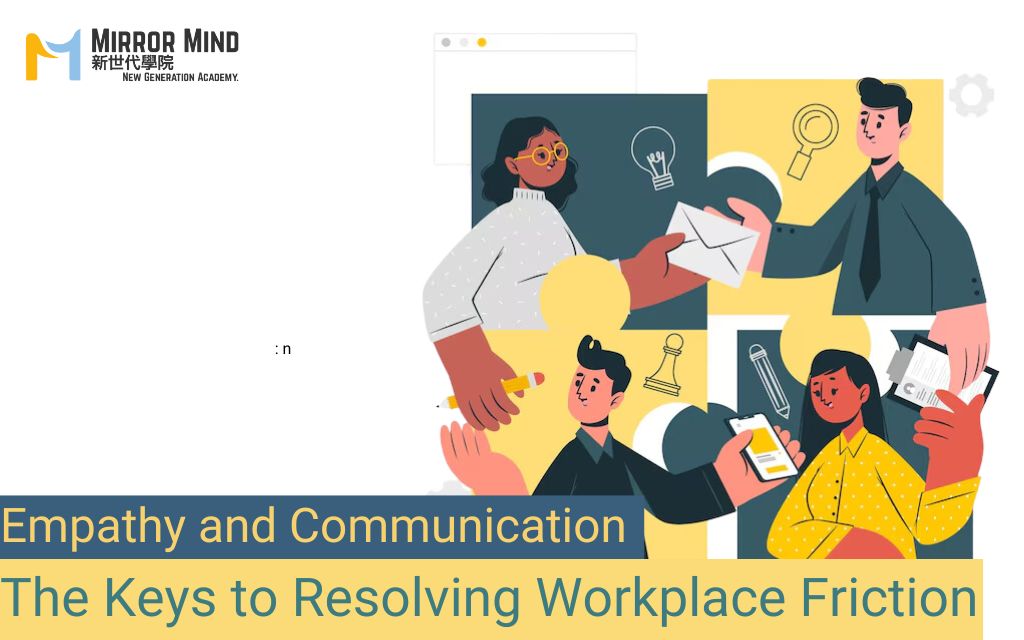Empathy and Communication: The Keys to Resolving Workplace Friction
- 作者: Kay Chu
- 刊登日期: 2024-10-14 13:00:21
- 41 人已經看過
- 職場技巧

It is practically impossible to avoid encountering unpleasant colleagues at work. A colleague who avoids responsibilities, often disrupts others, or spreads negativity can create a stressful work atmosphere. Is it necessary to bear silently in these situations? In fact, this method exacerbates our emotional weight, harming both professional performance and mental wellness. Is there a better way to deal with these colleagues?
Is Silent Endurance Really Effective?
Choosing to silently endure may appear to be a means to avoid conflict, but it is not a long-term solution. According to psychologist Daniel Goleman, repressing emotions just increases stress, which eventually harms mental and physical health and leads to a lack of enthusiasm at work. As a result, rather than choosing endurance, it is preferable to use more constructive techniques to manage relationships with unpleasant coworkers, which can significantly minimize stress.
The workplace is full with diversity and diverse personalities, which often leads to tension. According to Social Role Theory, people play distinct roles in different work situations, which can often conflict. Friction becomes more noticeable when job objectives, communication styles, or attitudes diverge. This is why, even if we believe we get along well with the majority of our coworkers, there will always be a few that make us uncomfortable.
For example, a detail-oriented employee may view a colleague who loves to work swiftly as inefficient, whilst the latter may regard the former as too picky. In such circumstances, friction is sometimes caused by differences in work styles and values.
Here are some practical strategies that can help us resolve issues more effectively when dealing with difficult colleagues:
1. Empathy and Perspective Taking
Learning to see things from the other person's point of view helps us better comprehend how they behave. This not only helps to reduce emotional conflict, but also promotes communication. When we strive to understand why the other person behaves the way they do, we can establish common ground and approach the situation more rationally and calmly.
For example, instead than becoming enraged or merely accepting a colleague's repeated interruptions during meetings, try to determine whether they are worried or eager to convey their thoughts. When you demonstrate empathy for their sentiments, they may be more open to your feedback and suggestions, resulting in a better engagement dynamic.
2. Adjusting Communication Style
Communication styles differ, which causes some tension. People have different communication styles; some prefer to be upfront, while others prefer more indirect or subtle ways. Adjusting our communication style to fit the other person's can help to reduce misunderstandings and facilitate consensus-building.
For example, if you observe that a coworker expresses their thoughts openly while you usually communicate more discreetly, strive to be more direct when addressing issues with them. This will make you appear more transparent and make it easier for your colleague to accept your point of view.
3. Creating A Positive Team Culture
Beyond personal strategies, creating a positive team culture is critical. Even when problems develop, if the team fosters a good, open environment, people will be more willing to talk and address issues. As a leader or team member, you can actively promote open communication in which everyone feels comfortable sharing their ideas without repressing or disguising displeasure.
The American Psychological Association found that teams with a good communication culture have a 25% boost in employee happiness and productivity. This highlights how important a positive team culture is for resolving interpersonal issues.
4. Seeking mediation or support.
If disagreements with coworkers cannot be handled through direct discussion, requesting third-party aid may be a reasonable alternative. This impartial party could be a manager, an HR representative, or a senior coworker. Having a mediator allows both sides to calmly review the situation, with the third party providing advise for resolution.
Famous Quote Support
As psychologist Alfred Adler once stated, "All problems are interpersonal relationship problems." This quote underlines how important it is to manage friction in interpersonal interactions. Many of the employment obstacles we confront stem from interpersonal conflicts. As a result, learning to manage conflicts constructively with coworkers not only improves job performance but also promotes personal growth.
Dealing with unpleasant coworkers is difficult because everyone has diverse origins, values, and communicates in different ways. We do, however, have the option of approaching these difficulties in several ways. Rather than simply enduring or avoiding disagreements, learning to actively address them with constructive solutions can not only enhance our self-management but also change the team dynamic.
As professionals, do we tend to avoid or tolerate workplace conflict? Is this technique actually effective? Consider implementing the tactics described in this article, such as active listening, modifying communication style, and seeking help, as you reflect on your behavioral patterns. This will not only improve your dispute resolution abilities, but will also make your job more fun.
As Adler pointed out, interpersonal interactions are at the heart of many workplace difficulties. When we effectively solve these problems, we not only improve our professional skills but also contribute to the overall harmony and success of the team. Remember that the most successful method for dealing with a tough coworker is actively seeking answers rather than silent endurance.
為何選擇Mirror Mind
Mirror Mind 新世代學院以教練技巧及培訓,幫助企業及社區跨世代共融,提升本地企業及人才競爭力。
擁有 2,000 名學生
大量真實客戶案例
培訓超過 7,000 小時
擁有豐富業培訓經驗
橫跨 30 多個行業
為不同行業提供合適培訓
